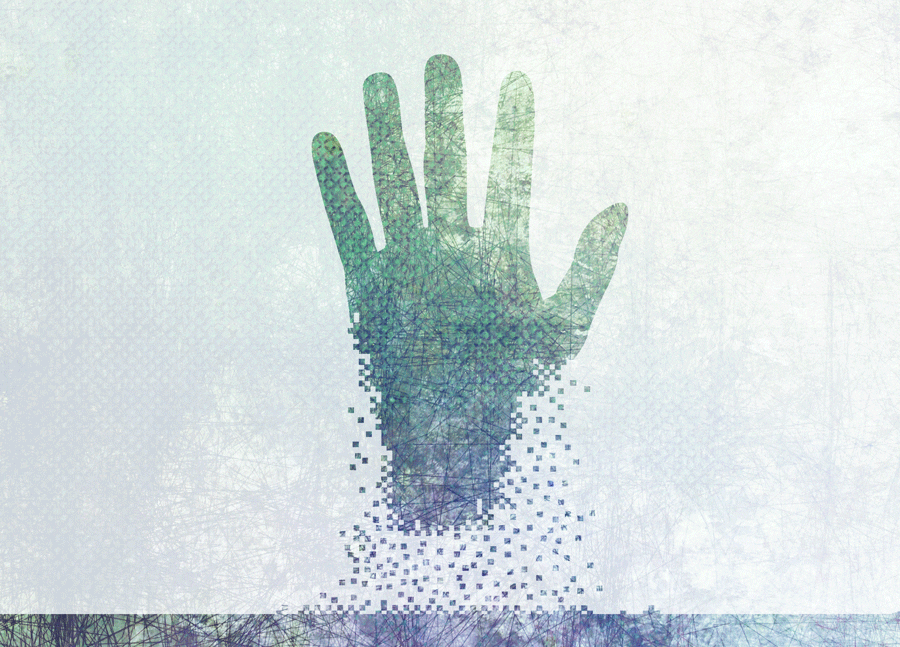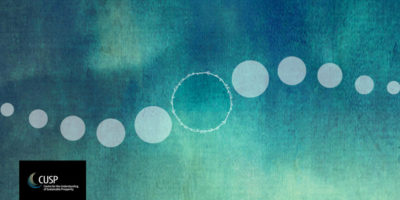A New Professional Ethics for Sustainable Prosperity
Prof Melissa Lane, Princeton University
CUSP Essay Series on the Morality of Sustainable Prosperity | No 1

Whose job is it to save the planet? Apart from a very few people—the director of Greenpeace International or the French minister who presided over COP 21 (the 21st Conference of the Parties of the United Nations Framework Convention on Climate Change), say—the task is not in anyone’s job description. Even those whose jobs involve some kind of responsibility for sustainability may take their professional responsibility to be bounded by, even exhausted by, the current ambitions and commitments of their organization within the field. Yet there is no guarantee that the current configuration of norms, whether for markets, professions, or government regulation, is sufficient to achieve a truly sustainable society. On the contrary.
Suppose that we understand sustainability as involving self-reinforcing norms over the long term, norms that support development and more generally social and economic activity that ‘meets the needs of the present without compromising the ability of future generations to meet their own needs’ (to invoke the summary definition of sustainable development from the 1987 Report of the World Commission on Environment and Development led by Gro Harlem Brundtland).1 The externalities associated with impacts on the long-term future are difficult for economic systems to incorporate, whether market or non-market systems, and even effective governments can struggle to take them fully into account. The pressures of more immediate gains in the short-term are felt by individuals, firms, and governments alike. Then it is as understandable as it is grave that the norms that would govern a truly and sustainably prosperous society—norms that would ‘reconsider the meaning of time, investment, futurity and wealth’ among other values, as another scholar has observed—are currently largely lacking.2 To attain a sustainably prosperous society cannot be done by sustaining current understandings of what roles and regulations should be. It will require radical change within them.
Multiple actors have roles to play in achieving this transformation. There are some key roles that only the state or inter-governmental organisations can undertake, others that involve behavioral choices by individuals. Most discussions of the ethics of sustainability focus on one of these two levels, the macro or the micro, as it were. This paper, in contrast, attends to what might be called the meso layer of activities and organisations lying between the state and the individual. Within this layer, it attends specifically to the role of the professions, as organized bodies that are defined and licensed in significant part by their role in achieving the public good. Insofar as a sustainable and sustainably prosperous society is a new articulation of what the public good requires, it is incumbent upon professionals to incorporate it into their self-understanding and social role.
I argue for a transformation in the understanding of professional ethics, so as to recognise sustainability as an overarching societal good for the achievement of which professionals bear a shared responsibility. Whereas traditional understandings of professional ethics and roles focus on responsibilities to clients or employers, and only in a general way to society more broadly, my proposal embeds sustainability far more specifically into ongoing transformation of the detailed self-understanding of professionals and the organizations that represent and govern them. To achieve sustainable prosperity, we can’t afford to hide behind the permissions attached to our professional roles as they now stand. Being a responsible professional, entrusted by society with the privileges of such a role, should involve an orientation to taking initiative in bringing about the future that global society most needs. Precisely because that future does not yet exist—indeed is threatened by the current course of carbon emissions and associated forms of development—the duties on professionals should be acknowledged to be far more demanding, both of judgment and effort, than is generally recognized today.
In short, I share the view articulated by Harold T. Shapiro, president emeritus of Princeton University, that ‘bringing a renewed focus to the expansion of the moral imagination and ethical responsibilities of institutions and professions is a very compelling task in front of us all’, and that ‘[o]ur failure to do so…could seriously undermine our capacity to create a better future for the generations that will follow us’.3
What makes this call especially challenging, however, is the fact that, beyond broad frameworks such as that provided by the UNFCC, there is no global normative authority able definitively to judge or to coordinate what counts as successful achievement of this good. Even at the level of individual nation-states, the task of articulating what sustainable prosperity as a public good requires, is one that the state can accomplish only in dialogue with groups and individuals within civil society. Any current articulation by government or any other party is always open to further challenge and discussion. Thus, in calling for professionals (among others) to make on a contribution to this task, one is calling for them to embark on a course which can always entail challenge, revision, and redoubled effort, one without final or incontestable markers of success. This is true. It is also inevitable. The nature of ethical debate within individual societies and across global society, is that norms emerge unevenly, piecemeal and contested, and that actors can never have final confidence that their current interpretation of the norms or actions according to them will not be judged wanting by others. If sustainability is considered as a candidate ‘universal value’, this is precisely to make it subject to — rather than insulated from — such ongoing debate.4
What is sustainability?
What do I mean by sustainability? The WCED (Brundtland) Report definition of sustainable development quoted above offers a valuable starting point, stressing the ethical parity between meeting the needs of the present and those of future generations. The report spells out its conception more fully as follows: Sustainable development is development that meets the needs of the present without compromising the ability of future generations to meet their own needs. It contains within it two key concepts: (1) the concept of ‘needs’, in particular the essential needs of the world’s poor, to which overriding priority should be given; and (2) the idea of limitations imposed by the state of technology and social organization on the environment’s ability to meet present and future needs.5
To be sure, that is a definition of sustainable development, focused on a standard of economic development that can be made sustainable between present and future persons, though elsewhere the report observes that ‘the case for the conservation of nature should not rest only with development goals. It is part of our moral obligation to other living beings and future generations’.6 Sustainability as a whole encompasses these wider moral obligations to sustain valuable aspects of the biosphere more generally over time, treated as encompassing and dynamic connections between environment, non-human and human forms of life. While scholars continue to debate precisely what can and should be sustained on this scale (for example, whether substituting some forms of natural capital by manufactured or human capital is acceptably sustainable or not), this debate still allows us to proceed with a working conception of sustainability understood as ‘a general, pluralistic, open principle that allows for many different solutions to be democratically discussed and acted upon’ in response to dynamic processes.7
In particular, sustainability will involve a longer-term time horizon than is common to most market-oriented perspectives today. While governments can impose longer time horizons through regulation, they too are subject to shorter-term orientations, especially due to the short-term pressures that electoral accountability can impose in democratic, and to an extent even in non-democratic, political systems. In fact the question of how far into the future planning for sustainability should go is a profoundly difficult one. Nuclear waste management is governed according to one timespan, plastics recycling another. The open-endedness of this question (within the bounds of the sun’s eventual collapse) means that defining the relevant time horizon for a given decision in light of an aspiration of sustainability will always remain open to substantive debate. No single model of risk or cost-benefit analysis can claim absolute authority.
So understood, sustainability does not by itself answer the question of value; it opens that question and invites debate as to how the values at its heart should be filled in. As a first pass, we can think of sustainability as a condition on any idea of the good that people or politicians might pursue. So one might pursue a career in publishing—sustainably; fight poverty—sustainably; raise children—sustainably; work as an architect—sustainably. One might pursue liberal or conservative aims for society—sustainably. All of these only count as full goods when done in a sustainable manner. So sustainability doesn’t exhaustively specify the good; it constrains and conditions what can sensibly count as a good. And it’s that role of sustainability as what philosophers call a ‘side-constraint’, governing how we pursue other goals, that is in play for me here.8
For a society to be sustainable, it needs to produce the attitudes and ideas that underwrite its continuation. Let me rephrase that in an active voice. For us to co-produce a sustainable society is for us to engender in ourselves and in coming generations its sustaining values: the values needed to animate and support our ongoing relationships with each other and with nature and non-human forms of life. A sustainable society must be a stable one, one with a mutually reinforcing—rather than undermining—relationship between the constitution and the people who make it up, the citizens. That is a lesson I have drawn in my work from Plato’s Republic, which studies the dynamics of how to stabilize a society over time through the individual motivations that interact to produce and reproduce valuable social relationships.9
Now the usual way to talk about the responsibility for achieving sustainability is not focused on professionals. Quite the opposite. It is far more common to invoke either the special responsibilities of leaders at the macro level of the state, or the ethical responsibilities of persons generally, focusing on the micro level of the individual.10 Insofar as a bridge is sometimes built between these levels by addressing individuals in their role as citizens, this still results in ethical injunctions that do not differentiate one individual citizen from another. The language of environmental stewardship, for example, whether emerging from religious faith traditions or from virtue ethics in philosophy (or both), is virtually always deployed as addressed either generally to citizens, or universally to individuals in light of their moral obligations. The focus is on identifying politically or universally valuable dispositions (even when conceding that these will be called for and exercised differently in different circumstances).11
Yet if we speak only of what people generally, or citizens collectively, are responsible to do about sustainability, we ignore powerful forces shaping much of their everyday behavior and informing many of their actual choices: those deriving from their occupational roles. If people’s choices in the course of their work, at the meso level of analysis, are wholly insulated from concerns about sustainability, then a huge lever for moving in the direction of sustainable prosperity will be either missing or counterproductively deployed. We need to consider the potential energy for achieving social goals that could be released by incorporating them appropriately into the incentive and value systems—education, credentialing, and arbitration, on the one hand, best practice on the other—of professional roles. Embedding sustainability goals in appropriate ways into recertification courses, professional meetings, mutual evaluation, and fiduciary duties, would put them on the agenda of widespread social practices and organizations which at best pay them vague lip-service today.
This is because, to the extent that people are absorbed in the everyday life of commercial interactions; consider themselves entitled, or even bound, to put the role-duties arising from their place in those interactions first; and understand those duties as separate from—or even contrary to—the broader social aims of sustainability, then appeals to countervailing values that appeal only to more general duties of humanity or citizenship are likely to fall on deaf ears. Modern capitalist democracies pride themselves on the thought that people can be simultaneously citizens and entrepreneurs, workers, professionals— that Jean-Jacques Rousseau’s fear that one cannot be simultaneously ‘man and citizen’ (in his eighteenth-century terminology) was ill-founded. Yet that idea is not so easily realized as we like to imagine. Apart from the difficulty of protecting the time needed to attend civic meetings and suchlike in a world of zero-hour contracts and constantly changing shift assignments, the issue is that if people consider their occupational lives to be insulated from broader civic aims, they will spend most of their time and energy pursuing goals and making choices that may well be at odds with those goals rather than serving them.
Sustainability and the division of labor
To see why professional roles and social goals can diverge in such a way, it is helpful to take a step back to consider the division of labour that serves as the basic framework of modern society. As analyzed by the eighteenth-century economist Adam Smith, the division of labor assigns each economic participant a particular specialised role, which increases everyone’s productivity and so betters society overall. Playing the role of a butcher or baker—or lawyer or architect —in the division of labor means that you don’t personally have to try to work out what contribution you can best make to society. Rather, you just get on with it, trusting that the unintended consequences of your private actions will benefit others. As Smith famously put it in An Inquiry into the Nature and Causes of the Wealth of Nations: ‘It is not from the benevolence of the butcher, the brewer, or the baker, that we expect our dinner, but from their regard to their own interest’.12
The danger comes when some of the unintended consequences of market interactions are negative as well as positive—and when they have not been taken into account into the formulation of market rules and roles. This is exactly the problem today of unsustainable side effects. The unintended consequences of fossil fueled economic development are starting to hit the wall of ecological sustainability. So the great solution for modernity outlined by Smith and his fellow theorists of commercial society, a division of labour providing simultaneously for individual satisfaction and social benefit, has now become part of the problem causing unsustainable development—at least until we realize that what we feed into the division of labor the roles and rules that go into it, determine the value of what we will get out.
The division of labour is a mechanism; it is an invaluable mechanism, but still only a mechanism. If unsustainable conceptions of self-interest and occupational roles are fed into it, unsustainable outcomes are likely to emerge—unless some redefined rules and roles intervene. This leads us to the next part of this paper: an inquiry into the nature of occupational roles, and in particular, professional roles, and how they fare when considered in light of the challenge of reaching sustainable prosperity.
Why seek sustainable professions, and how?
Let us pause for a moment on the nature of the professions. As Harold T. Shapiro has observed, ‘an institution or profession is an entity endowed by public policy and legal and cultural traditions with certain privileges and associated public purposes’.13 While individual professions may have arisen prior to state regulation, most have now become licensed and regulated by modern states—a development with important implications for the ethical expectations attached to them. Shapiro argues further ‘that the public and social purposes of institutions and professions, properly considered, will define a set of moral obligations that may lie quite beyond their legal and/or purely parochial concerns such as maximizing shareholder returns or enhancing the financial well-being of professionals’.14 This paper considers sustainability as part of that broader set of moral obligations.
Before we turn to that external or instrumental purpose, as it were, of the social recognition of professions, we need to consider how it is reflected in a profession’s internal point of view. To practice a profession is to declare one’s commitment, to avow a purpose. Professio in Latin is a declaration, an avowal, or a commitment, and in English, this commitment is the one for which a professional stands. So a profession involves a claim to special knowledge and an allegiance to a commitment that extends beyond what might be conceived as immediate self-interest, for example gaining clients or maximizing profit considered in isolation.15 Moreover, that higher commitment is often understood as necessarily connecting to a key aspect of well-being and flourishing. Such a goal offers the ‘guiding ideals [of the profession]’ that its practitioners internalize.16
While many professions—doctor, architect, lawyer—have deep historical roots, the field of ‘professional ethics’ is in one sense a modern invention, concomitant with the ‘professionalization’ of different roles in the course of the nineteenth and twentieth centuries. This is a history that has been variously told from more, or less, ethically jaundiced points of view. For some sociologists, for example, professionalization is merely a cover for the self-assertion of various occupational groups, meaning that there is no reason to give moral weight to whatever professional roles they succeed in carving out for themselves.17 For other scholars, especially in history, philosophy and political theory, professional roles do embody, and so define, ethically relevant requirements.18 The latter is the perspective adopted here, as a normative approach that can stand independently of the historical record of how professions came to be defined as they now are. For present purposes, I will also sidestep philosophical debates about how central, or how derivative, role morality is in relation to broader moral frameworks. Suffice it to hold, I think with common sense, that roles—and professional roles in particular—do make an important moral difference to the duties of those who occupy them (even if that difference-making potential in turn has clear moral limits).
Proceeding in this way, we may adopt the following starting points offered (from a virtue-ethics perspective) in work co-authored by Justin Oakley and Dean Cocking: (1) ‘good professional roles must be part of a good profession’; (2) a good profession is ‘one which involves a commitment to a key human good’; (3) ‘professional integrity’ can be a valid reason for professionals to refuse a patient’s or client’s request; (4) such ‘professional integrity’ involves a duty to the public, and contrasts with conscientious refusal on the basis of private conscience.19
It is point 2 that best articulates the public value of professions: their commitment to serving or advancing a key human good. As William May put it in a trenchant article that originated in a public lecture, professions properly conceived have ‘public duties’—ones that he argues are undermined by careerist pressures to privatize one’s choice of, and performance of, an occupation as if it served merely personal ends.20 May canvasses various reasons that ‘professionals owe something to the common good’. On his view (a view that overlaps with that of Shapiro, quoted earlier), this is in part because of their historical public calling, in part because of current public licensing—both formal and informal ‘license to operate’—in part because ‘[w]hat they do fatefully affects the society at large,’ and in part because they owe their formation to the public goods provided by (in most cases) a university education.21
Very little literature on the ethics of the professions goes beyond that point. Indeed little enough of it goes even to that point. In fact, scarcely any discussion of professional ethics has asked the specific question, of what the professional role must be such that it will be at least compatible with the overall social vision of sustainable prosperity.22 To be sure, and important as a base for this more ambitious question, most scholars of professional ethics agree that in a broad sense ‘the professions are to serve society’.23 And one author of a widely used text in this area does acknowledge that ‘the study of professional ethics’ must include ‘an analysis of the proper roles of professions in society’, for ‘[o]ne cannot simply accept the prescription by professionals of their own roles’.24 But when this author turns to delineate the more precise ‘areas of concern’ for his analysis, these bear only on relationships between clients and professionals (including how those bear on professionals’ relationships to others, and how widely professionals’ services are available) and between professionals and their firms or employers.25 At most, as in the work of Oakley and Cocking quoted above, serving the public good is conceived as a matter simply of omission: of refusing and refraining from harm, rather than of considering how actively to advance the good. Yet the public good of a transformed and sustainable future is unlikely to be realized by occasional refusals alone. More can, and must, be expected of the professionals whom society licenses to operate for the sake of the public good.
We can do better by adopting a more positive and ambitious perspective: ‘no role without a responsibility for the whole’. And that means that caring about the whole is itself part of any occupational or specifically professional role. The public good is not an inert thing to be treated as a parameter. It is not even just a defined set of interests and needs. It must involve an appropriate attitude of care and concern, concern that one’s role-specific actions not undermine it but rather, where possible, are compatible with advancing it.26
Going further, we may distinguish three levels of professional obligations concerning their role in relationship to the broader social whole—the third of which is rarely if ever recognized in the professional ethics literature today.27 The first level is to operate within the existing constraints of the role, but with an eye so far as possible—as a matter of general ethical responsibility falling on all—to ask how one can, consistent with the role as currently defined, contribute to the social good. We sometimes neglect the importance of how people choose to act within their defined roles. But the question ‘which way do you lean?’ is actually a profound one, and our answers to that question are responsible for much of the social good or bad that ultimately occurs.28
The second level is to engage in ‘discussions, from within the profession itself, of what the code [of ethics governing the profession] should be’.29 These of course are discussions that go on all the time. But it is not generally recognized as a professional obligation to take part in such discussions. Neither are these discussions generally oriented to broader questions of the social good—nor in particular to the aspiration to sustainable prosperity. There are of course important exceptions. The American Psychological Association has recently engaged in a wrenching reexamination of its code relating to the involvement of psychologists in military related situations of torture or near-torture.30 And previously, it released a report on the responsibilities of psychologists in relation to sustainability.31 But both of these are unusual cases. Imagine the advances toward sustainability that could be made if each professional association recognized a responsibility to put them on the agenda each year, and to debate ways in which its current code of practice, professional training, and other defining features either impede or advance those goals.
Finally, there is a third-order professional responsibility to engage with the wider public in debating, precisely, what the contours of the profession’s rights and responsibilities should be. This is a very important check on the possible ways in which the first and second order might otherwise run amok, or less floridly, become detached from the ongoing public debates about precisely what sustainability (and other values) mean and what changes in the duties and entitlements of various occupations its achievement entails. Imagine at this third level, for example, pesticides regulators (albeit that they are not strictly speaking professionals in a narrow sense of the term) pressing lawmakers to require them (the regulators) to consider the interaction of different chemicals, rather than their risks to health and environment only in isolation. Or American accountants pressing the United States goverment to adopt the International Accounting Standards Board approach of standards that focus on compliance with moral duties and general principles, as opposed to the American GAAP or Generally Accepted Accounting Principles that take a more narrowly legalistic approach of compliance with particular regulations, excluding consideration of whether, all things considered, a set of accounts gives a fair overall picture relative to all major factors and concerns.32
These third-level duties are duties of professionals without being duties that they can fully discharge alone. To put it another way, professionals are not the final authorities in defining either the public good, or the scope of their own roles to contribute to it, vis-à-vis the wider society. It is part of their task to engage in both conversations, but it is equally part of their task to do so in partnership with the wider society, and without assuming that their idea of the public good or their self-conception is automatically trumps. The effort to redefine professional norms in relation to a redefined understanding of the public good will inevitably be largely led by professionals themselves as part of their ongoing, state-supervised patterns of self-regulation. But it could only succeed within an ongoing dialogue between professionals, their associations and bodies, and broader aspects of society, including the media and groups within civil society. Professionals do not have a monopoly on defining the contribution that society can legitimately expect of them to make to moving toward sustainable prosperity, let alone on defining what sustainable prosperity itself entails. But they do have a responsibility to speak up, to initiate and to respond within the process of societal consultation, as both definitions evolve.
This is because the relationship of roles to the wider whole—and the understanding of what that wider whole requires—are neither of them matters of professional expertise or judgment alone.33 They are democratic questions and egalitarian ones, ones on which those affected by professionals’ acts or omissions, and those concerned to advance social goals more rapidly or fully, have as much right to speak as do the professionals themselves. There is no fixed standard or guarantee that this process of social and democratic deliberation will arrive at the right answers, nor that any given professional or professional body can be sure that they for their part have done so. But this is the nature of public ethics in democratic, or at least open, contexts. One plays one’s part, does one’s best, learns from criticism, and continues to iterate. No one gets either a free pass or a free ride.
This means that humility is an essential professional virtue (as it is, indeed, an essential virtue for all of us). In an interlocking system of roles, experts are not experts on what the scope of their own domain should be relative to the whole, nor on what the whole requires to reconfigure it. Hence it becomes a professional task to recognize one’s own limits and to continue to learn. Indeed the general expectation, often a legal requirement, of continued professional education, should bring with it continued education in exploring these questions, and a continued obligation in sharing that exploration also with one’s clients or patients as well as with one’s fellow professionals and the wider society. None of this features in standard handbooks of professional ethics. It should.
Taking the initiative
To move between these levels, and to operate at each of them, takes initiative. For none of this will happen automatically. If professionals continue to concern themselves primarily with the permissions attaching to their roles as currently defined, the higher order challenges of rethinking these norms will go unaddressed. Yet a common response to this problem (for those who think about it at all) is to ask why one professional should take on these extra burdens of reshaping and debating the norms of their role, when others don’t. This is a version of a widespread inhibition against action toward sustainability more generally. It is the ‘why me?’ objection.34
A first answer to the ‘why me’ objection is to consider personal and professional duties at the first-order level as being non-contingent on the actions of others. Philosopher Dale Jamieson has suggested that the appropriate response to uncertainty about whether others will act is a principle of ‘noncontingency’, meaning that one’s actions (specifically, the action of minimizing our contribution to the harm of carbon emissions) should generally not be contingent on one’s beliefs about the behavior of others.35 This is because such contingency would require calculation of innumerable effects, the impossibility of which would risk leading to a ‘downward spiral of noncooperation’.36
We need to go still farther. For it is not enough to carry out one’s first-order professional duties. One must also take initiative on the second and third levels of those duties: for appropriate initiative in reinhabiting, reshaping and rethinking one’s professional role should itself be incorporated into our standing norms of professional integrity. This means that it is not enough to say, there is no point in my acting if not enough others act as well. Rather, my ethical and indeed my professional task in those circumstances is to consider what I can do to make it the case that enough others will act along with me. It’s not enough to cling to stasis when the urgent need is to generate momentum.
What might this look like in practice? Consider the case of architecture. Many architectural theorists have already acknowledged that the needs that architects must take into account include not only those of their clients, but also those of the wider society. For example, architectural theorist Tom Spector distinguishes between two sets of needs: those of ‘individual members of society,’ who ‘require someone to construct buildings that presumably accord with their needs,’ and those of ‘the public at large’.37 In thinking about the latter needs, architects are actors in their own right, responsible for the plans they draw up and (to a certain extent) for their consequences when built.
But architects will rarely operate entirely on their own initiative. They are most often commissioned by clients—whether modest or wealthy individuals, or corporate or state entities. And these clients themselves have key powers to initiate or to withhold action in altering the built environment (though subject to state approvals and so on). So one crucial question for architects in particular is: to what extent does their role include the taking the initiative in counseling their clients to pursue more rather than less sustainable building plans? If sustainable architecture involves, as Richard Rogers has advocated, plans that are ‘long life’, ‘low-energy’, and ‘loose fit’, among other features, whose job is it to ensure that this is the approach to be taken?38
Here the role of an architect can be compared to that of ancient and Renaissance ‘advisors to princes’: political thinkers who sought to give good counsel to powerful rulers, counsel that (ideally) would serve the interests of the wider community, yet who were constrained in doing so by a delicate sense of what the ruler was likely to want to hear, and so likely to tolerate hearing, or even to be able to hear. Men like Thomas More, Niccolò Machiavelli, and many others explored the ethical challenges of giving advice to rulers, especially in the sixteenth century, drawing on a tradition with classical roots in Isocrates, Seneca and others. They knew that this was no easy task. The dangers of submerging one’s judgment in flattery to win a job, on the one hand, or of being rejected by the ruler on the other (something that could lead to losing not only one’s job or position but one’s head), were both great. Yet the duty remained on the advisor to chart a course between these twin dangers, using the skills of persuasion and judgment to try to awaken the client’s enthusiasm for the best path.
The responsibility of giving counsel is an onerous and tricky one. Indeed the advisory role of professionals must be conceived as more ethically burdened than the armies of for-hire consultants in today’s economy are often willing to acknowledge. It involves initiative, and judgment, in this case on the part of the architect, who has constantly to judge which way to lean in making one’s own decisions (to invoke that image once again), and how far, and when, to push. And it also involves a willingness on the part of the architect to engage, and to expect their clients to engage, with wider publics both on the sustainability of particular building projects, and also on the broader expectations of their respective roles.39
Making judgment calls of these broad kinds was part of the classical role of advising a ruler. It was not something that could be pushed aside with a narrow, blinkered conception of the advisors’ responsibility as being only to carry out whatever the ruler might antecedently believe themselves to want. So today, the broader social vision of sustainable prosperity is one that will require all professionals—indeed all occupants of roles in the economy—to consider their responsibility to lean, to push, to initiate, to reshape and to rethink the actions within their power, so as to be so far as possible part of the solution rather than part of the problem.
Conclusion
As we think about the responsibilities of citizens and of professionals alike, we must recognize that the ideas of unintended consequences and the complex modern division of labor have reached their limit. We can no longer afford to license social roles or standards which manifest indifference or even hostility to their effects—intended and unintended—on the health of society as a whole. Adam Smith’s heedless rich lived in a time in the eighteenth century when they had the luxury to indulge themselves, creating jobs without (so far as they believed) causing social harm. We do not have that luxury. Only a fundamental reimagining of our roles and ourselves, of our professions and our identities as citizens and how they fit together, can generate the initiatives needed to achieve a sufficiently sustainable society, sufficiently soon, lest we suffer the fate described by Martin Luther King, Jr.: “Over the bleached bones and jumbled residue of numerous civilizations are written the words: ‘too late…’.”40
Notes
1 The World Commission on Environment and Development [WCED] Report, United Nations General Assembly (1987) Our Common Future, chapter 2, paragraph 1.
2 Smith, J. (1999) ‘Environmental Sustainability and Architecture’, Scroope: The Cambridge Architecture Journal 11:101-104, at 104.
3 Shapiro, H.T., ‘Public Citizens: The Ethical Responsibilities of Institutions and Professions’, 55 Plus Lecture, Princeton, New Jersey, September 2014, on file with the present author, at 14.
4 For a brief discussion of what it is for something to be a ‘universal value’, focused on the case of democracy, see Sen, A.K. (1999) ‘Democracy as a Universal Value’, Journal of Democracy 10: 3-17.
5 WCED Report (1987), chapter 2, paragraph 1.
6 WCED Report (1987), chapter 2, paragraph 55; this section of the report is cited as a relevant modification of the more widely noted definition of sustainable development in chapter 2, paragraph 1, in Brennan, A. and Lo, Y.-S., ‘Environmental Ethics’, The Stanford Encyclopedia of Philosophy (Fall 2016 Edition), Edward N. Zalta (ed.), URL = <http://plato.stanford.edu/archives/fall2016/entries/ethics-environmental/>.
7 Arias-Maldonado, M. (2013) ‘Rethinking Sustainability in the Anthropocene’, Environmental Politics 22: 428-446, at 430.
8 Lane, M. (2011) Eco-Republic: Ancient Thinking for a Green Age. Oxford: Peter Lang, a work drawn on in this paragraph and the preceding one (see 20-21), and more generally for much of this paper; North American edition published as Lane, M. (2012) Eco-Republic: What the Ancients Can Teach Us about Ethics, Virtue, and Sustainable Living. Princeton: Princeton University Press. These paragraphs are also used in the related lectures by Melissa Lane delivered in the following settings: ‘Eco-Republic: Plato and Sustainable Citizenship’, The 2012 Navin Narayan Memorial Lecture in Social Studies at Harvard University on 11 October 2012; Public lecture in the 5000 Pound Life series on ‘Sustainable Citizenship’ delivered to the Architectural League of New York on 29 October 2013; and the Common Humanities Lecture on ‘Sustainable Citizenship’ delivered at the University of Florida on 27 January 2014. I am grateful to all these institutions for the honor of delivering these lectures.
9 This paragraph draws on ideas in Lane (2011) Eco-Republic, 83-4, 126, and passim,
10 That approach to professional ethics in terms of the general duties of citizenship was the approach taken in Lane, M. (2013) ‘Sustainable Citizenship’, whereas in this paper I focus on professional ethics in their own right.
11 See for example Welchman, J. (1999) ‘The Virtues of Stewardship’, Environmental Ethics 21: 411-23.
12 Smith, A. (1776), An Inquiry into the Nature and Causes of the Wealth of Nations, Book I, chapter ii.
13 Shapiro, ‘Public Citizens’, 5.
14 Shapiro, ‘Public Citizens’, 5.
15 Pellegrino, E.D. (2007) ‘Professing medicine, virtue based ethics, and the retrieval of professionalism’, in R.L. Walker and P.J. Ivanhoe (eds), Working Virtue: Virtue Ethics and Contemporary Moral Problems. Oxford and New York: Clarendon Press, 61-86.
16 Oakley, J. and D. Cocking (2001) Virtue Ethics and Professional Roles. Cambridge and New York: Cambridge University Press, 87.
17 See for example Larson, M.S. (1977) The Rise of Professionalism. Berkeley: University of California Press.
18 See for example the historical study by Kimball, B.A. (1992) The “True professional ideal” in America: a history. Cambridge, MA: Blackwell.
19 Oakley and Cocking (2001) Virtue Ethics and Professional Roles, 74 [for points 1 and 2], 82-3 [for points 3 and 4].
20 May, W.F. (1992) ‘The Beleaguered Rulers: The Public Obligation of the Professional’, Kennedy Institute of Ethics Journal 2: 25-41, at 27.
21 May (1992) 33-34.
22 As Andrew Sabl puts a similar thought with reference to political roles, ‘the best way of doing political ethics is to ask what a democratic political order most needs’. See Sabl, A. (2002) Ruling Passions: Political Offices and Democratic Ethics. Princeton: Princeton University Press, 96.
23 Bayles, M.D. (1989) Professional Ethics, 2nd edition. Belmont, CA: Wadsworth, 5.
24 Bayles (1989) 5.
25 Bayles (1989), 3.
26 This idea is discussed in May (1992). The relevance of care was drawn to my attention in work in progress by Giulia Sissa about Plato, presented at the Fünfter Internationaler Kongress der Gesellschaft für Antike Philosophie in Zürich in September 2016.
27 Surveying a number of works in the field of professional ethics, one finds this dimension altogether or virtually absent. See for example Bayles (1989), a widely used guide, and the essays collected in Baumrin B. and Freedman B. (eds) (1983) Moral Responsibility and the Professions. New York: Haven. A welcome exception is one edited volume which includes a section on ‘Professionalism, Justice, and Social Welfare’: Martin, C., Vaught, W., and Solomon, R.C. (eds) (2010) Ethics across the Professions: A Reader for Professional Ethics. New York and Oxford: Oxford University Press.
28 I owe this formulation of the question to Adam Tooze, in work that we did together at the University of Cambridge, for what is now the Cambridge Institute for Sustainability Leadership.
29 Williams, B. (1995) ‘Professional Morality and Its Dispositions’, in Williams, Making Sense of Humanity. Cambridge: Cambridge University Press, 192-202, at 200.
30 See the APA Ethics Committee Statement ‘No Defense to Torture’ as amended November 2015: http://www.apa.org/ethics/programs/statement/torture-code.aspx, and the associated documents available on the APA website.
31 Swim, J. et al. (2009) ‘Psychology and Global Climate Change: Addressing a Multi-faceted Phenomenon and Set of Challenges. A Report by the American Psychological Association’s Task Force on the Interface Between Psychology and Global Climate Change’. Available online at: http://www.apa.org/science/about/publications/climate-change.pdf, last accessed 30 October 2016.
32 For an illustration of the difference, see the remark that ‘The concept of IFRS being principles-based, and US GAAP being principles-based but also rules-laden, is perhaps nowhere more evident than in the area of revenue recognition’, in PWC, ‘IFRS and US GAAP: Similarities and Differences,’ sec. 3.2, available at http://www.pwc.com/us/en/cfodirect/assets/pdf/accounting-guides/pwc-ifrs-us-gaap-similarities-and-differences-2015.pdf (last accessed 30 October 2016).
33 I owe this thought to remarks by Dennis Thompson following the delivery as a public lecture of Melissa Lane, ‘When the experts are uncertain: scientific knowledge and the ethics of democratic judgment’, Edmond J. Safra Center for Ethics, Harvard University, 1 December 2011. (A revised version of this paper, with the same title, has been published in Episteme 11:1 (2013) 97-118.)
34 Lane (2011).
35 Jamieson, D. (2007) ‘Why Utilitarians Should Be Virtue Theorists’, Utilitas 19: 315-331, at 318. Discussion of Jamieson here is from a paper forthcoming as Lane, M. ‘“For My Part”: Reflections on Individual Agency’, in S. Smith and K. Forrester (eds) Political Thought and the Environment. Cambridge: Cambridge University Press.
36 Jamieson (2007) 318.
37 Spector, T. (2001) The Ethical Architect. Princeton: Princeton Architectural Press, 6, a reference I owe to Nicholas Ray.
38 These features of Rogers’ view, as summarized from his book Cities for a Small Planet (London: Faber and Faber, 1997), are cited from the discussion in Smith, ‘Environmental Sustainability and Architecture’, 104.
39 Emmerich, Z. (1999) ‘Architecture as Social Contract’, Scroope: The Cambridge Architecture Journal 11: 32-39, at 39, calls along similar lines for development of ‘practical mechanisms of popular active inspection of architectural projects’. The role of popular inspection and holding to account is developed as an aspect of one approach to ancient Greek democracy and popular sovereignty in overlapping papers by Lane, M. (2013) ‘Claims to rule: the case of the multitude,’ Cambridge Companion to Aristotle’s Politics, eds. M. Deslauriers and P. Destrée, Cambridge: Cambridge University Press, 247-74, and Lane, M. (2016) ‘Popular Sovereignty as Control of Officeholders: Aristotle on Greek Democracy,’ in Popular Sovereignty in Historical Perspective, eds. R. Bourke and Q. Skinner, Cambridge: Cambridge University Press, 52-72.
40 Martin Luther King, Jr., ‘Beyond Vietnam: A Time to Break Silence’, speech on 4 April 1967 to a meeting of Clergy and Laity Concerned at Riverside Church in New York City, cited from http://www.informationclearinghouse.info/article2564.htm.
Acknowledgements
I am grateful to Harold and Vivien Shapiro for having suggested the above quotation in commenting on a presentation of the ideas of Eco-Republic.
More generally, I should like to thank Michael Lamb for research assistance on which this paper draws, supported in part by the Princeton University Institute for International and Regional Studies research community on ‘Communicating Uncertainty: Science, Institutions, and Ethics in the Politics of Global Climate Change’. The present material is further based upon work supported by the Princeton Environmental Institute and the Andlinger Center for Energy and the Environment at Princeton University, by the Princeton Climate Futures Initiative to which they contribute support, and more generally by the questions explored at the Princeton University Center for Human Values; I thank all my Princeton colleagues in these endeavours, with especial thanks to Harold Shapiro for sharing ideas about the questions discussed herein and for comments on an earlier draft. Finally, I am grateful to Will Davies and his colleagues at the Centre for the Understanding of Sustainable Prosperity for the invitation to write this paper and for their feedback on earlier drafts.
About the author
Melissa Lane is the Class of 1943 Professor of Politics and the Director of the University Center for Human Values at Princeton University. An associated faculty member in the Princeton Department of Classics and Department of Philosophy, she researches and teaches in the area of the history of political thought, with a special expertise in ancient Greek thought, and in normative political philosophy, including especially environmental ethics and politics.
Discussion
The full paper is available for download in pdf (2MB). | Lane M 2017. A New Professional Ethics for Sustainable Prosperity. CUSP Essay Series on the Morality of Sustainable Prosperity, No 1. Guildford: Centre for the Understanding of Sustainable Prosperity.
Essay Series















